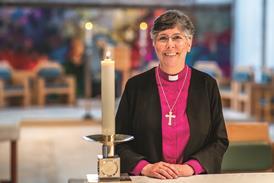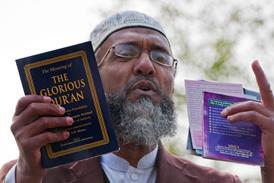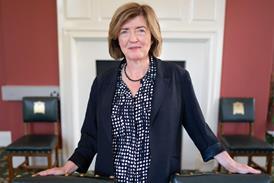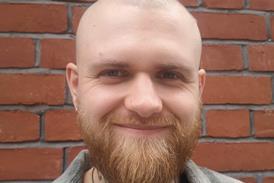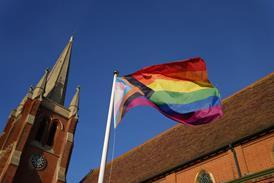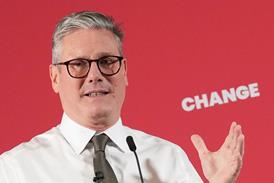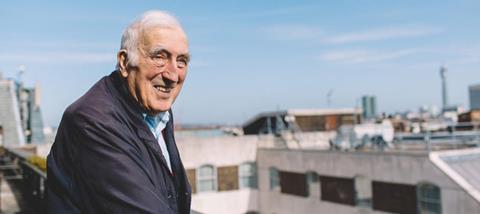
Jean Vanier is probably the closest person to a ‘living saint’ that I’ve ever met. The 86-year-old founder of L’Arche is softly spoken, unhurried, gentle and profound. I am meeting the Catholic philosopher and theologian shortly after his nomination as the winner of the £1.1m prestigious Templeton Prize (other recent recipients include Desmond Tutu and the Dalai Lama).
The prize recognises his lifetime’s work in establishing a worldwide network of communities where people with and without intellectual disabilities live together.
But these accomplishments are not really what Jean Vanier is being awarded the prize for. Important as the L’Arche communities are, Vanier’s true legacy will be the role he has played in reshaping society’s views on the value of disabled people. In doing so, he has been unashamed to name Jesus as the central model for the communities he has founded, and the moral centre of his own life.
It's about revealing to people that they are precious
The son of a Canadian diplomat, Vanier was educated in Canada, England and France and set out on a career to become a naval officer. But in 1950 he resigned his commission. ‘I resigned to follow Jesus,’ he says. ‘I had somewhere the intuition that peace could only come if the vision of Jesus was revealed; to bring people together and break down the dividing walls that separate people.’
That vision would lead firstly to teaching theology and philosophy as a university lecturer in Canada, but in 1964 Vanier began a personal journey towards a very different life. At the invitation of a spiritual mentor, he moved to the village of Trosly-Breuil near Paris, which housed an institution for people with intellectual disabilities. ‘There I discovered to my horror, the world of people with disabilities – who were oppressed, put away, seen as stupid, as idiots.’
Vanier moved in and set up a home with two disabled men, Philippe and Raphael. L’Arche was born.
Fifty years later, Vanier is still building the vision that Jesus gave him of communities that break down dividing walls. There are now 147 L’Arche centres in 35 countries, where people with and without disabilities live together as equals. There are a further 1,800 Faith and Light support groups, for people with special needs and their families and friends, across 80 nations.
Needless to say, the Templeton Prize money will go towards the work of these communities. Vanier himself, who still makes his home with his friends in Trosyl-Breiul, has no need of it. Nor of the titles it brings him. From the beginning Vanier has learned that at L’Arche, people don’t care about titles or achievements, only love.
Tell me about Philippe and Raphael, the two men that your journey began with in 1964.
Philippe had encephalitis, with one leg paralysed. His parents were dead and he had a real disability. Raphael had had meningitis. He could only say a few words and had a very fragile body, so he could fall easily. And so, living together was buying the food, cooking the food, wiping up all the mess, going out and doing things, inviting people. But essentially it was life around the table.
You had a successful academic career ahead of you. What made you want to take this step?
I wanted to follow Jesus. There are some things you do without reasoning. Are you married?
Yes.
Why did you get married to your wife?
Because I knew she was the one, I suppose.
This is the thing. There are things you know without reasoning it out; without doing the pros and the cons. You know this is what you should do. It’s something about individual conscience, that little interior voice.
That small community became a large one of over 30 people. What lessons did you learn?
That every person is beautiful and that each one has something to give. In the community there is a mission, and that mission is to help people with disabilities, and the mission is what holds us together.
Could you describe, in a few words, that mission?
Helping each one, through relationships, to discover how beautiful they are. The whole story of people with disabilities is that they’ve been humiliated and pushed into an institution. They’ve always been treated as no good, or as idiots, or whatever it is. So it’s about revealing to people that they are precious. That means listening to them, understanding them, doing things that help them to grow. Having fun together, and so on. The important thing is just to say, ‘I’m happy to be with you.’
Where do you see Jesus in the daily life of the community?
Is it ‘seeing Jesus’? Or just living what Jesus would live? It’s a question of loving people as they are. Not just people with disabilities but also the assistants [L’Arche’s volunteers]. The whole vision of Jesus is just to ‘love one another as I have loved you’. To love people is not to do things for them, but to reveal to them that they have value. There’s a person under the abilities and the disabilities – that’s the heart.
The whole thing is helping people discover that they are precious because they’re capable of relationship and of love. Not to develop some capabilities but essentially to develop relationship.
And you see that as a key part of what Jesus did in his ministry?
That’s all he did. Healing people to help them to love and give thanks. The vision of Jesus is to announce good news to the poor. But to announce good news to the poor is to announce that ‘You are precious’. So it’s not saying ‘God loves you’, but ‘I love you’.
It’s easy to say to the poor, ‘God loves you, bye-bye.’ But it’s the lonely who are crying out to discover that they are loved. And not just loved by God, but loved by you and me.
Are there particular stories you recall of people whose lives have been transformed by the community they’ve found at L’Arche?
Everyone is transformed in some way. Pauline came to us with one arm paralysed, one leg paralysed, and epileptic. But her reality was that she was a woman who was in fury, enraged. Our situation is a small house, and to live with somebody who is screaming their rage is not all that easy. We had a very good psychiatrist and he said, ‘You know, she is angry because she’s lived forty years of humiliation. Nobody has wanted her. Nobody has seen her as being of any value.’
So, what she’s asking for is to enter into a relationship with us – not to tell her what to do, but to have fun with us. And it’ll take time, because when somebody’s lived with forty years of humiliation, it takes time to find trust. To trust in the assistance, trust in people, trust that you are loved, trust that you have value. She just loved singing and dancing, even with one leg. She loved to dance and she sang Parisian songs.
There's a difference between applause and being loved
At the end of her life, sometimes I would go and sit beside her and we would talk and she would put her good arm on my head and she would say, ‘Poor old man!’ To move from violence to tenderness takes time.
The heart of L’Arche is to live tenderly, and tenderness is to see in people their beauty. It’s having – what you would call in French bienveillants – kindly eyes, to look at people kindly. That means without judgement, without fear – to see people as people.
Many people with severe learning disabilities may never come to an intellectual understanding of Christianity. In what way do you see their relationship with God nevertheless being very evident?
I think as soon as we love people, we’re with God. That’s what St John says: ‘If you love, you’re born of God and know God.’ If you know God, you love. If you love, you know God. So it’s not about concepts; it’s to live. And to live by loving people and loving your enemies, not judging them. The whole vision of Jesus is an incredible vision.
Is there a danger that Christians become too concerned with the theory rather than its application?
‘They will know you are my disciples by the love you have for them.’ It’s as simple as that. It’s to be open. Even open to those who are against you. Don’t judge. Don’t condemn. Love.
The famous theologian Henri Nouwen was profoundly impacted by the L’Arche community, wasn’t he?
He was a big intellectual. I visited him in Harvard where he was giving talks. The class was filled with people and he was applauded. Then he came to L’Arche and I suggested that he become the priest of the community in Toronto. And there, he wasn’t applauded, but he was loved. There’s a difference between applause and being loved.
One of his gifts was a great fidelity. If somebody fell sick, he would go and visit them in hospital a number of times. He had a very deep sense of being a priest of Jesus and entering into relationships of fidelity with people. But in himself, he was torn, because he was always wanting to write a new book. It was a tension inside him.
It’s a tension in all of us I think, to be known for what we do and our achievements.
It’s the tension between the significant and the insignificant; between the achievement and the littleness. To be a Christian is just to love people who are different, not because they’re going to give you power, but just because they’re crying out for a friend and you want to be their friend.
In recent years it’s become increasingly easy to screen out through abortion people who might otherwise be born with disabilities. What’s your view of that cultural shift?
We’re moving into the same reality with euthanasia. People, once they get old, are no longer useful, they cost money. That’s where I think Christianity is prophetic.
The prophecy that every person is important whatever their disability and whether they have Alzheimer’s or not. We create a culture for winners and then there’s lots of losers. And the losers are also many young people who are confused and see the world, but they cannot enter it. So we’re entering into a very painful world; the culture of the winners. And I think that your magazine can speak prophetically into this.
In all the years you’ve been doing this work, have you ever asked God, ‘Why do you allow people to be born with disabilities that exclude them in society?’
We could also ask, ‘Why did you create people who will die?’ It would be so much nicer if we all lived to 2,000 years! It’s the reality of weakness. But weakness means, ‘I need your help.’ So we are trying to create a world of individuals who have come to success but don’t need people until they start getting weak. Where weakness is, that brings us together. I think the whole vision of Jesus is about bringing people together. And that means your weaknesses, my weaknesses. We need each other.


